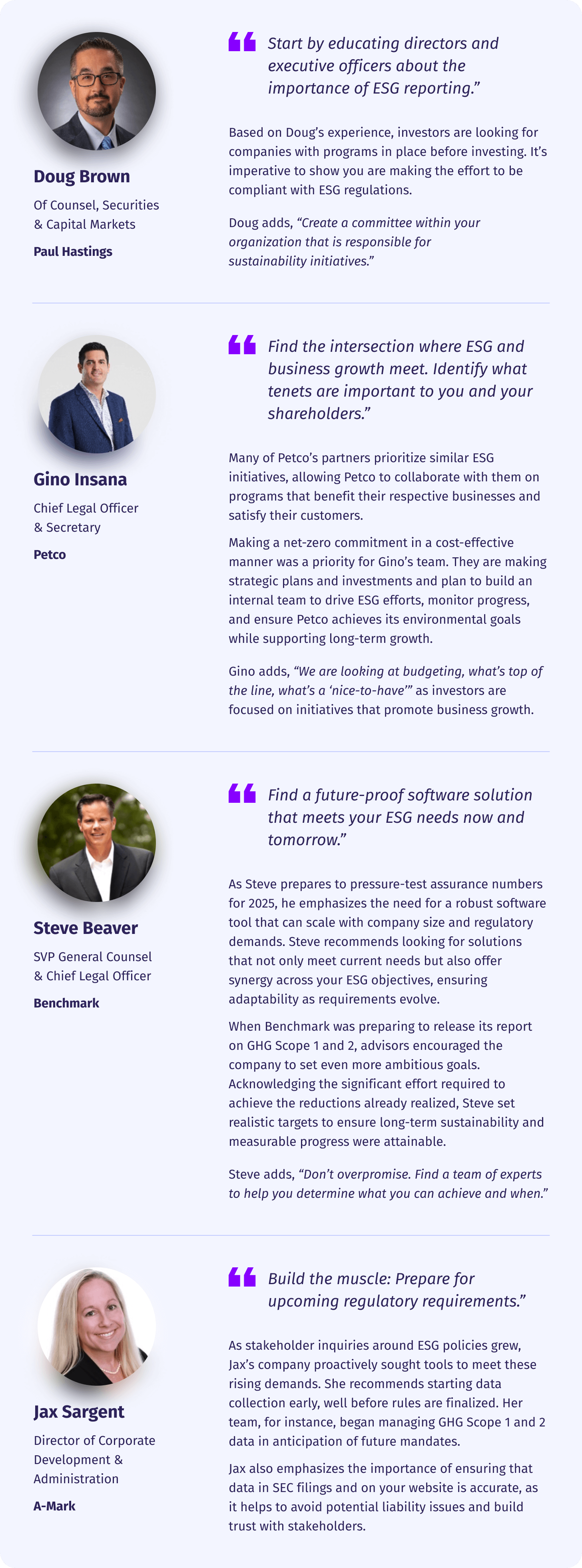For years, organizations have touted their sustainability and corporate social responsibility efforts in voluntary reports. Increasingly, though, company stakeholders are demanding more accurate and transparent Environmental, Social, and Governance (ESG) data.
Both retail and institutional investors, for example, are focused on the intersection of ESG data and business growth, recognizing that a company’s commitment to an ESG strategy can signal both future opportunities and risks. To investors, strong sustainability performance suggests that a company is not only responsibly managing its environmental impact, social responsibilities, and governance practices, but is also positioning itself for long-term success. Companies with robust sustainability practices are viewed as lower-risk, forward-thinking investments that are better prepared to navigate future challenges and drive value.
How Sustainability Programs Have Evolved in Recent Years
Regulators are also emphasizing ESG performance, pushing companies to enhance transparency around ESG by mandating compliance and disclosure requirements. In March 2024, the U.S. SEC introduced long-awaited climate disclosure mandates—a major win for climate advocates; however, the mandates were quickly paused due to legal challenges, giving some companies additional time to strengthen their ESG programs. Despite this, U.S. companies operating in the EU and other regions remain obligated to meet stringent international reporting requirements.
Most recently, Governor Gavin Newsom of California signed Senate Bill 219 (SB-219) into law, mandating all U.S. companies doing business in the State of California that meet certain financial thresholds to report on greenhouse gas (GHG) emissions and climate-related financial risks.
It is estimated that SB-219 will affect over 10,000 large businesses today. However, far more small and medium-sized value-chain businesses will also be impacted and required to report climate-related information. With more than 90% of S&P 500 companies now publishing ESG reports on a regular basis, the time when smaller companies could safely ignore ESG is more than likely at an end.
How to Build a Strong Sustainability Foundation
Now that sustainability initiatives have been cemented as a crucial element of reporting for most companies, it’s time to build a proper ESG framework. Here are five steps for building an ESG program:
Assess Material Topics: Identify the ESG metrics that are going to be most relevant to the company’s operations and investors.
Set Governance Structure: Establish the board oversight protocols and define accountability across teams.
Integrate with Strategy: Connect sustainability goals to financial performance and risk management strategies.
Develop Data Infrastructure: Implement tools to ensure consistent data collection and validation.
Prepare for Assurance: Create transparent documentation and audit trails.

ActiveDisclosure for ESG
DFIN’s ActiveDisclosure for ESG Reporting helps forward-thinking business leaders navigate the complexities of ESG reporting and meet the rising demands from investors and regulators. The purpose-built ActiveDisclosure platform streamlines data collection and drives efficiency through real-time collaboration, paired with expert advisory and consulting services, enables teams to work together seamlessly within a single system.
Additionally, DFIN's experts also assist companies in understanding changing global regulations (including the EU's CSRD and California's SB-219), and in creating ESG reports that align with requirements across various regulatory jurisdictions.
For more insights, check out DFIN’s ESG Panel recording or check out the on-demand webinar A Rational & Affordable Solution to ESG and Sustainability Excellence.



